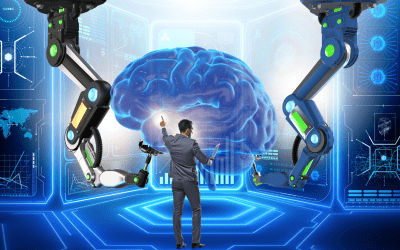Table of Contents
Introduction:
Small businesses often face challenges in maximizing productivity and efficiency due to limited resources and small teams. However, one solution that has gained traction among small business owners is using artificial intelligence (AI) to automate repetitive or time-consuming tasks. Artificial Intelligence technology can help small businesses reduce costs, increase efficiency, and improve accuracy. In this article, we will explore in detail the benefits and drawbacks of leveraging Artificial Intelligence to increase productivity in small businesses.
Pros:
- Increased Efficiency: Artificial Intelligence can be used to automate repetitive tasks, allowing small businesses to increase efficiency and productivity. This frees up time for employees to focus on more strategic tasks that require critical thinking and problem-solving skills. For example, Artificial Intelligence can automate tasks such as data entry, scheduling, and report generation, which saves time and energy for employees.
- Improved Accuracy: Artificial Intelligence can help small businesses improve accuracy by reducing the risk of human error. Machines can process large amounts of data and make calculations faster and more accurately than humans. This is particularly useful in industries such as finance and accounting, where accuracy is critical. For instance, using Artificial Intelligence for tax filing can minimize human error and reduce the likelihood of incurring fines.
- Cost Savings: Automating tasks with Artificial Intelligence can lead to significant cost savings for small businesses. By reducing the number of employees required for routine tasks, businesses can save on labour costs. This allows small businesses to invest in other areas of their business, such as marketing or product development. For instance, a company can use the savings to hire more skilled employees or increase marketing efforts to reach more customers.
- Better Customer Service: Artificial Intelligence can help small businesses improve customer service by providing faster, more accurate responses to customer inquiries. Chatbots, for example, can be used to provide instant responses to frequently asked questions, freeing up employees to focus on more complex customer inquiries. This can lead to improved customer satisfaction and loyalty, which is critical for small businesses that rely on customer retention.
- Competitive Advantage: Small businesses that leverage Artificial Intelligence to increase productivity can gain a competitive advantage over their competitors. By automating tasks and improving efficiency, small businesses can operate more efficiently and effectively than their competitors. This can lead to increased market share and profitability. For instance, AI can help small businesses analyze market trends and customer behaviour, allowing them to create more targeted marketing strategies.
Cons:
- Initial Investment: One of the biggest drawbacks of implementing AI in small businesses is the initial investment required. AI technology can be expensive, particularly for small businesses with limited resources. There may be significant upfront costs associated with purchasing and implementing AI systems, which could be a barrier to entry for some small businesses. The cost may include hardware and software purchases, training and development, and maintenance costs.
- Lack of Understanding: Many small business owners may not fully understand how AI works or how it can be applied to their business. This could lead to a lack of trust in the technology and reluctance to invest in AI systems. It is essential for small business owners to educate themselves about the benefits and drawbacks of AI and how it can be used to improve their business. This includes identifying areas in their business where AI can be used to improve efficiency, productivity, and customer satisfaction.
- Job Losses: Automating tasks through the use of AI could lead to job losses for some employees. This could have a negative impact on morale and employee retention, particularly if employees feel that they are being replaced by machines. It is essential for small business owners to communicate openly with their employees and involve them in the decision-making process when it comes to implementing AI. This includes offering retraining opportunities or finding other areas within the company where their skills can be utilized.
- Dependence on Technology: Small businesses that rely heavily on AI systems may become overly dependent on technology. This could be problematic if there is a system failure or breakdown, leading to a halt in business operations. Small businesses must ensure that they have backup plans in place in case of technological issues. This includes having a backup system or manual processes that can be implemented in case of an emergency.
- Privacy Concerns: AI technology relies heavily on data, which raises concerns about privacy and data security. Small businesses must ensure that they are following best practices when it comes to data collection and storage. This includes implementing security measures such as encryption and ensuring that customer data is not shared or sold to third-party entities. Failure to protect customer data could lead to legal and financial repercussions for small businesses.
Examples of Artificial Intelligence Applications in Small Businesses:
- Data Entry: Small businesses can use Artificial Intelligence to automate data entry, which can save time and reduce errors. For example, optical character recognition (OCR) technology can be used to scan and digitize paper documents. This technology can then extract data from the documents and input it into the appropriate fields in a database.
- Customer Service: Chatbots and virtual assistants can be used to automate customer service tasks, such as answering frequently asked questions and providing support to customers. This can improve response times and reduce the workload for employees.
- Inventory Management: Artificial Intelligence can be used to optimize inventory management by predicting demand and ensuring that the right products are in stock. This can reduce waste and improve customer satisfaction by ensuring that products are always available.
- Marketing: Small businesses can use Artificial Intelligence to analyze customer behaviour and preferences, allowing them to create targeted marketing campaigns. This can help small businesses reach the right audience with the right message, improving the effectiveness of marketing efforts.
- Accounting: Artificial Intelligence can be used to automate accounting tasks such as bookkeeping and tax filing. This can save time and reduce the risk of errors, allowing small businesses to focus on other areas of their business.
Conclusion:
Leveraging Artificial Intelligence to automate repetitive or time-consuming tasks can help small businesses boost productivity and make better use of their limited resources. The benefits of Artificial Intelligence include increased efficiency, improved accuracy, cost savings, better customer service, and competitive advantage. However, there are also drawbacks, including the initial investment required, job losses, dependence on technology, and privacy concerns. Small business owners must weigh the pros and cons of implementing Artificial Intelligence and identify areas in their business where Artificial Intelligence can be used effectively. By doing so, small businesses can maximize productivity and efficiency, ultimately leading to increased profitability and growth.
If you need any assistance to implement Artificial Intelligence Tools into your business, reach out to us. Book a Call and we will be more than happy to assist.
For more Stories and Tech updates, check out our other blogs.




0 Comments